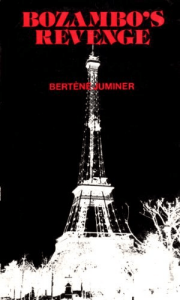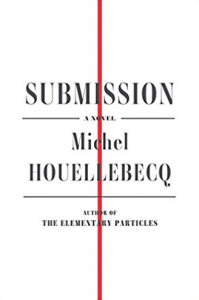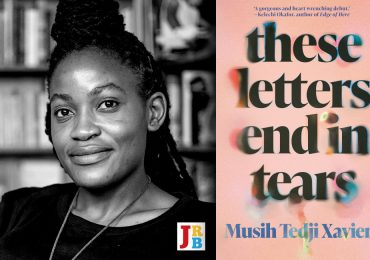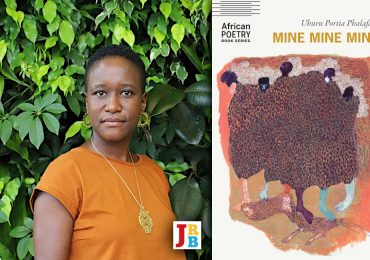La Revanche de Bozambo / Bozambo’s Revenge
Bertène Juminer
Présence Africaine, 1968 (French ed.)/Three Continents Press, 1968 (English ed.)
Submission
Michel Houellebecq
William Heinemann, 2015
1.
When I packed a grey T-shirt emblazoned with the words ‘Made in German’ (sic) before a trip to Germany, the act struck me as corny, like wearing those T-shirts from an earlier era that said, ‘My daughter went to New York and all I got was this lousy T-shirt’.
I was headed to Weimar for the inaugural Kultursymposium, a conference organised by the Goethe-Institut under the theme ‘The sharing game: sharing and exchange in culture and society’. The ornate and elegant Weimar is Goethe’s city and also Europe’s culture capital. It is also the city in which Germany’s first democratic constitution was signed, the document which gave rise to the republic that reigned between 1918 and 1933, just before Hitler and his Nazi friends took over.
‘We should give as much as we are willing to take … The principle is simple: a gift must be accepted and reciprocated,’ read a statement by Klaus-Dieter Lehmann, a librarian by training and president of the Goethe-Institut. But Europe at that time wasn’t feeling particularly generous. Over in Britain, people felt overrun by migrants from Eastern Europe who were ‘taking away their country’. Indeed, a little over a fortnight later, British people would vote with bitterness in their hearts and frowns over their faces to pull out of the European Union. Germans themselves were coming to terms with the fact of the almost one million, mostly Syrian, refugees they had accepted into their country.
While in Weimar I didn’t wear the T-shirt at all; it was only later when I visited Berlin that I wore it. During the course of that day, I and two friends had to see off a South African artist at Tegel Airport. While standing outside the main terminal building, keeping a friend who was smoking company, I became aware of a gaggle of old white women staring at me. What were they staring at? Maybe this was a non-smoking area. We had been drinking German beer and my mind was a bit slow, but even for slow minds, there is a moment when you finally get it. It was the ‘Made in German’ T-shirt that had caught their attention.
They must have thought I was a cocky refugee, who wasn’t just a recipient of German asylum papers but who had somehow contrived to discover German heritage in the process. Later, as we went around the city on the buses and trains, I received the same astonished stares that I had seen on the faces of those older women at the airport.
But was this not a homecoming of some kind? Wasn’t it in Otto von Bismarck’s Berlin, in 1883–4, that the modern concept of Africa had first been formulated? It was a point that Cameroonian filmmaker Jean-Pierre Bekolo made, at one particularly sulphurous discussion at the conference: Africa is an invention of the West. The filmmaker was, of course, acknowledging the work of VY Mudimbe, a Congolese scholar about whom Bekolo has made a documentary, Mudimbe’s Order of Things—a cerebral and intensely personal portrayal of the life, beliefs and scholarship of one of Africa’s most original thinkers.
2.
At the time of the trip, I was reading Bozambo’s Revenge, a small, counterfactual novel, of just 116 pages, by Bertène Juminer, a French-Guyanese medical doctor and writer. It’s set in a France that has been colonised and bequeathed a civilisation by Africans. ‘If we are to believe the account of certain historians, Bantouville is a kind of a small paradise which African genius has created from a swamp by the banks of the Sekuana, a lazy and capricious river which the natives call the Seine,’ the novel begins.

I had borrowed Bozambo’s Revenge from Fani Jongwe, a Zimbabwean writer and poet, and a friend whose office is as likely to divulge an African classic as a Russian one. He had probably bought the book on Harare’s second-hand book market, a Wild West of sorts, where, when you balk at the US$50 price tag of The Great Betrayal by Ian Smith, the bookseller will smile at you and remark, ‘it’s signed’, as if I care for that particular racist’s signature; as if, between 1965 and 1979, when Smith was prime minister of Rhodesia, he didn’t sign decrees and laws that made the life of the majority of that nation’s people hell.
Bozambo’s Revenge first came out in French in 1968 as La revanche de Bozambo and appeared in English shortly thereafter. It was Juminer’s third novel. Apart from Inspector General Bozambo, a bureaucrat, and his rival in the security state Commander Adiami, against whom the theme of revenge is centred, the other main protagonists in the novel are Gallic independence activist Edgar Dupont and his nephew Anatole Dupont.
The latter, a white native from the region of Provence, is, at the start of the novel, getting off a train to settle in the aforementioned Bantouville. ‘After getting off the train, the White Native is sifted through Customs and the Internal Migration Service. There are never any Blacks in the long waiting queues, since they are exempt from these formalities.’ Further, the white natives have to carry a ‘permit to circulate; certificate of Baobabist baptism; of employment; of good character; of non contagion; and of residence in Bantouville’. (Not to belabour the point, but the administrative rituals and procedures of Bantouville are reserved only for the native non-blacks; meanwhile black South Africans of a certain age will be intimately familiar with the humiliation and inconvenience this entailed in real life.)

As I read this, my mind drifted to A Walk in the Night by Alex La Guma, that native of Cape Town and a communist, and one of the most memorable passages in his novel:
When African people turn 16 they are born again or, even worse, they are accepted into the mysteries of the Devil’s mass, confirmed into the blood rites of a servitude as cruel as Caligula, as merciless as Nero. Its bonds are the entangled chains of infinite regulations, its rivets are driven in with rubber stamps, and the scratchy pens in the offices of the Native Commissioners are like branding irons which leave scars for life.
‘Where is your pass, kaffir?’
‘It is here.’
‘Ah, I see that you are from such and such a place. Where is your permission to travel from there?’
‘It is here.’
‘Good. Now having permission to travel from such and such a place, where is your permission to be in this place?’
‘It is here.’
But back to Dupont, who is from the provinces and holds a colonial school diploma. If it were up to him, he would have preferred to go to Africa for further education but he won’t even bother applying to the Ministry of Overseas Territories, for applications by non-blacks are ‘automatically rejected’. But the natives are restless; they organise under the resistance movement known as the Gallic Anticolonialist Movement, whose leader, Escartefigue, is in prison. As Anatole walks, the hatred of and bitterness for the coloniser is visible on some of the walls: ‘Free Escartefigue!’ ‘Down with imperialism!’ reads the struggle graffiti.
How had the ‘light continent’ ended up under the rule of the Africans? Before it became Bantouville, the city had been a small village on the banks of a river the natives called the ‘Seine’. Many Africans had visited it and ‘attempted to establish the healthy Negro ethos’ there. But owing to domestic troubles, which later became anarchy, ‘the Baoulian Republic (a name derived from Baoule, an Ivorian ethnic group, but which here represents the African masters) found herself forced, in the interests of peace and universal civilisation, to impose her rule’. Call it the black man’s burden.
Escartefigue, the imprisoned rebel, is the theorist of the Gallic resistance: ‘they tell us: “your very primitive dialect must disappear. Learn our beautiful language which is spoken by an entire continent, the most powerful on the face of the earth.” So we learn the beautiful African language! And our masters snigger when they hear us, they put us down in public, they ridicule our honky-talk’.
‘No one in my family has ever worn a bubu or borne an African name. My name is Georges Edouard Fernand Escartefigue and none can claim to be more Gallic than I. If, like all my classmates, I learned that my ancestors were called Baoulians, that they had black skin, kinky hair and wore their enemies’ testicles around their necks, I never really believed it. I am White; where I come from, we have always been White from father to son. I have no Baoulian ancestor. So it is in Gallic that I wish to speak’.
And on and on it goes, an endless transposition from white and black history to black and white.
Bozambo’s Revenge is, at the end of it all, an unsatisfactory novel: it promises much and yields little. It disappoints in the way, in a year of drought, dark rain clouds gather, only for a southerly wind to come and blow them off. After conjuring a vast, alternative world, it gets sidetracked and lost in a petty bureaucratic maze. The author surely knows that empires dwarf the petty rivalries of the foot soldiers who enable its wheels to turn.
3.
 Submission, Michel Houellebecq’s latest novel, came out in January 2015, a few days before the Islamist Charlie Hebdo attacks that left twelve people dead and others injured. The novel was considered so incendiary that for a period the writer had to lie low, while over at his publisher’s office armed sentries stood guard.
Submission, Michel Houellebecq’s latest novel, came out in January 2015, a few days before the Islamist Charlie Hebdo attacks that left twelve people dead and others injured. The novel was considered so incendiary that for a period the writer had to lie low, while over at his publisher’s office armed sentries stood guard.
In Submission, Houellebecq departs from the art and art history terrain he so imaginatively drew up in his prize-winning The Map and The Territory to return to the familiar acerbic worlds he conjured in books such as Atomised and Whatever. It is, in other words, the return of the real Houellebecq.
The Islam in Submission is not, as Houellebecq once said in an interview, ‘the most stupid of religions’. The faith the Frenchman writes about is closer to the religion Ayatollah Ruhollah Khomeini gestured at when he declaimed, ‘Islam is politics or it is nothing’. In Submission, the religion assumes politics in the form of the Muslim Fraternity, an imaginary Islamist party led by Mohammed Ben Abbes. The novel is set in the French election year of 2022 but, judging by what happens, it probably ought to be 2072. With 21.9 per cent of the vote, the socialists are out, while the Muslim party, with 22.3 per cent of the vote, are second to the right-wing National Front led by Marine Le Pen. As there is no outright winner, discussions are underway about the composition of a new government.
Yet, after the poll, all was changed, if you took care to look and listen. ‘When I went in to teach my class, I finally felt that something might happen, that the political system I’d grown up with, which had been showing cracks for so long, might suddenly explode,’ writes Francois, an academic and the book’s narrator, who seems a barely disguised stand-in for Houellebecq himself. ‘It may also have been the way the girls in burkas carried themselves. They moved slowly and with new confidence … as if they were already in charge.’
The phobia that has lived deep in the bowels of Europe since the days of the Moors is reawakened. The Muslims, they are coming, and there is no stopping them.
Over a drink with Francois, a spy with details about the negotiations tells the narrator about the sticking points. It’s necessary to quote at length what this is about:
The Muslims are ready to cede more than half the ministries—even key ministries, like finance and the interior. That’s not the trouble. On the economy and fiscal policy, they and the Socialists see eye to eye. The same goes for security, and what’s more the Muslims can actually bring order to the banlieues. In foreign policy, they want France to take a slightly firmer stance against Israel, but that’s hardly a problem for the left. The real difficulty, the sticking point, is education. Support for education is an old Socialist tradition, and teachers are the one profession that has stood by the party, right to the end; but now the Socialists are dealing with people who care about education even more than they do, and who won’t back down. The Muslim Brotherhood is an unusual party, you know. Many of the usual political issues simply don’t matter to them. To start with, the economy is not their main concern. What they care about is birth rate and education. To them it’s simple—whichever segment of the population has the highest birth rate, and does the best job of transmitting its values, wins. If you control the children, you control the future. So the one area in which they insist on having their way is the education of children.
Our narrator asks, ‘But what do they want?’
They want every French child to have the option of a Muslim education, at every level of schooling. Now, however you look at it, a Muslim education is very different from a secular one. First off, no co-education. And women would be allowed to study only certain things. What the Muslim Brotherhood really wants is for most women to study Home Economics, once they finish junior school, then get married as soon as possible—with a small minority studying art or literature first. That’s their vision of an ideal society. Also, every teacher would have to be Muslim. No exceptions. Schools would observe Muslim dietary laws and the five daily prayers; above all, the curriculum itself would have to reflect the teachings of the Koran.
Houellebecq, sixty-one, spent much of his life seized by the thought that he was an atheist, and the nihilism of his earlier work is proof; now he’s no longer sure, maybe because after a life guzzling down bottles of wine and smoking packs of cigarettes, the day of death approaches. The sense of immortality that is part of the makeup of teenagers and those in their twenties has worn off. In an interview with The Paris Review, he said: ‘… contrary to what I thought, I never was quite an atheist. I was an agnostic. Usually that word serves as a screen for atheism but not, I think, in my case. When, in the light of what I know, I reexamine the question whether there is a creator, a cosmic order, that kind of thing, I realise that I don’t actually have an answer.’
After reading Submission, somehow I find myself pining for the less toxic Houellebecq of Atomised and Platform and The Map and the Territory, who didn’t care much about organised societies and organised religions (or, if he did, it came out in an impromptu, thoughtless quote), but was more concerned with his cock, sex and blowjobs.
It is bad enough for the Muslims of Europe without having conspiracy theories lent the credence of major fiction like Houellebecq’s novel. Millions left Algeria, Morocco, Senegal and other countries following the colonial encounter. In recent times, millions more have been driven away from Afghanistan, Iraq, Syria and Libya by perpetual wars started by Tony Blair, George Bush, Barack Obama and other western leaders. In other words, to remember my corny T-shirt, these refugees were ‘Made in Britain’, ‘Made In USA’ and ‘Made in France’. They’re real; they’re anything but flights of fancy or counterfactual fictions.
- Percy Zvomuya is a writer and football fan; follow him on Twitter
Index
Books
- Atomised by Michel Houellebecq
- The Map and the Territory by Michel Houellebecq
- Whatever by Michel Houellebecq
- A Walk in the Night by Alex La Guma
- The Great Betrayal by Ian Smith
Flims
- Mudimbe’s Order of Things, directed by Jean-Pierre Bekolo
Organisations
- Goethe-Insitut
Places
- Berlin
- Weimar
- Zimbabwe
People
- Tony Blair
- George Bush
- Ayatollah Ruhollah Khomeini
- Marine le Pen
- VY Mudimbe
- Barack Obama
- Otto von Bismarck
Poets
- Fani Jongwe
Topics
- Counterfactual fiction
- French elections
- Gallic independence






I am a keen scholar of Houellebecq’s fiction. I have read many responses to Soumission and there appears to be a line between those who understand his novel as an extension of the populist and nationally conservative Right (that he endorses and legitimises “conspiracy theories”), and those who read his work as satire that, to the contrary, ridicules and plays on the paranoias of the Right in order to underscore the absurdity of its counter-narrative: the protagonist, Francois, is so pathetic and opportunistic that it is almost impossible to take him seriously. I find both both of these approaches to the novel uncomfortable. I think the beauty of Soumission, and most of Houellebecq’s fiction, is that you never quite know whether to take him seriously. He is always somewhere in between the true and the absurd – and in most instances the true is the absurd. Above all, I do believe that he is a satirist and that it is never a good idea to understand his work as propagating a transparent message or conspiracy.